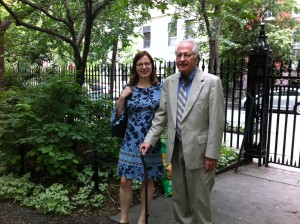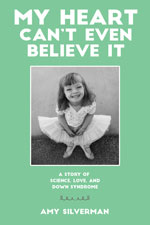
Fugitive Apostrophes: a Beautiful Tribute to a Father
posted Monday May 19th, 2014
An accomplished attorney named Dick Segal passed away this spring. He had lots of fancy titles and accolades, but to me, he’ll always be Dick Se., father of my oldest and dearest friend.
When Amy Segal and I met in Mrs. King’s second grade class at Hopi Elementary School in Phoenix, it was over a name situation. We cooked up a scheme that would allow us (well, me, mainly — I had the longer one) to avoid writing our entire last names on every paper, every time.
How about Amy Si. and Amy Se.? we asked.
Mrs. King said no. Amy and I bonded over the injustice of it all, and grew up to be two women who fight a lot. (Luckily very rarely with one another.)
We always laughed over the fact that her father and stepmother, as well as my parents, were named Dick and Susan.
And there was one more thing: We both lamented the fact that our fathers were men of few words. Looking back, I’m not so sure that was ever true. Maybe it’s just that Amy and I have such big mouths. Who can ever get a word in edgewise?
If you’ve met either or both of the Dicks, you might beg to differ on the chatty thing. In any case, both are pretty amazing fathers; over the years I’ve seen actions speak far louder than words. I doubt anyone would question that.
At Dick Se.’s memorial service yesterday, a lot of people shared Segalisms. No one shared my favorite: “There’s a pimple on her but(t) she was pretty.” I get it, it was a funeral. But I’ve always loved that one, not only because it’s a little naughty but because it’s a word play and it’s about looking at things from different angles and arriving at very different conclusions — something I’m sure he did a lot as a lawyer and maybe even as a father.
Listening to Amy’s recollections yesterday, I was struck with how proud I was of my friend, how graceful and wise and beautiful she is — and how proud her dad would be, too. Amy was kind enough to allow me to share her piece here.
When I was 3 years old and my sister, Lisa, was 5, she got to do something that I didn’t get to do. I have no recollection of what it was but, as our dad used to tell the story, I was none too happy about it. I told him, “It’s not fair!” He said, “Amy, life’s not fair.” And I said, “I know that. I’ve known that for a long time now.”
The reason I knew that at such a young age is because it was one of the many lessons that he taught us early and often. He understood that life wasn’t fair so it’s fitting that he devoted his entire career to seeking justice.
He was a brilliant lawyer. But it’s not something we knew much about growing up. He was a man of few words and didn’t speak of his accomplishments. So it was only over the last few weeks that I heard certain stories about his career for the first time. One of them was about how when colleagues asked him to review briefs, he would often reduce entire paragraphs to one sentence. I was amused by this because he was no different at home.
When we would ask him to review a homework assignment or a college application essay, he’d get out his pen and say, “Write like a man!” It didn’t occur to us at the time to say, “Dad! You can’t say that to your daughters. It’s sexist and politically incorrect.” Instead we just took out everything that was superfluous and are still doing that to this day. But even if we had articulated those thoughts at the time, it would’ve been nonsense directed at him because he was neither sexist nor politically incorrect. In fact, he was the exact opposite and always brought us up to believe that we could do anything we wanted to do.
Though he was fond of striking out words, he did love them. He was an avid reader and encouraged intellectual curiosity in those around him. When we would ask him how to spell something, he’d say, “Look it up!” And we’d say, “How can we look it up if we don’t know how to spell it?” And he’d say, “You’ll figure it out.” And we did.
In addition to reading, he loved to travel, hike Camelback Mountain and cook. As Lisa said recently, he was a foodie before foodie was even a word. I recall many weekend afternoons of him making elaborate meals with a football game on in the background. He loved to eat and he and Lisa would often have lunch at the latest restaurant in Phoenix while he and I would share reviews of restaurants in New York.
Not long ago, there was one in the Times about a new place called Uncle Boons. Boons is spelled without an apostrophe — even though one belongs there — and the food critic wrote, “Some New Yorkers are offering opinions about the curry while others are still puzzling over the fugitive apostrophe.” I read this on the subway on the way to work and smiled as I imagined an apostrophe on the run, holding on tight to a subway pole as it high tailed out of town.
I emailed the review to my dad and said, “Who would have thought that the words ‘fugitive’ and ‘apostrophe’ would ever appear in the same sentence, much less next to each other?” He wrote back almost immediately and said, “In Ulysses, James Joyce describes a man carrying a sign that is part of a letter sequence advertising some Dublin firm. This man carried the apostrophe. Maybe that is the one you’re looking for.”
It’s this type of answer that I’ll miss the most. Dad’s mind housed such a deep reservoir of knowledge and yet it revealed itself in measured and surprising ways. We all know really smart people who spend a lot of time telling us how really smart they are. He was not one of those people. Rather, he doled out wisdom more on an ‘as needed’ basis. But it wasn’t always what we expected or wanted. When we would ask him what the meaning of life was or what the purpose of it all was, he’d invariably say, “Wet birds don’t fly at night.”
What does that even mean? It made no sense to us and we wanted answers. So we asked the question in different ways — from all angles — hoping to catch him off guard so he’d tell us something more satisfying. But no. To the ‘big question’, all we ever got was, “Wet birds don’t fly at night.”
As young girls, this was a hard concept to wrap our minds around. As adults, we still have no idea what it means. And, yet, we know exactly what it means. He knew a lot but he didn’t presume to know everything and there were some things that he just wanted us to figure out on our own.
As we continue that journey, it won’t be the same without him. But Lisa and I have decided that whenever the ‘big question’ comes up, we can watch Monty Python’s The Meaning of Life because Dad loved Monty Python and we think that, in his absence, he’d find it perfectly fair for those guys to stand in as his proxy.








Leave a Reply